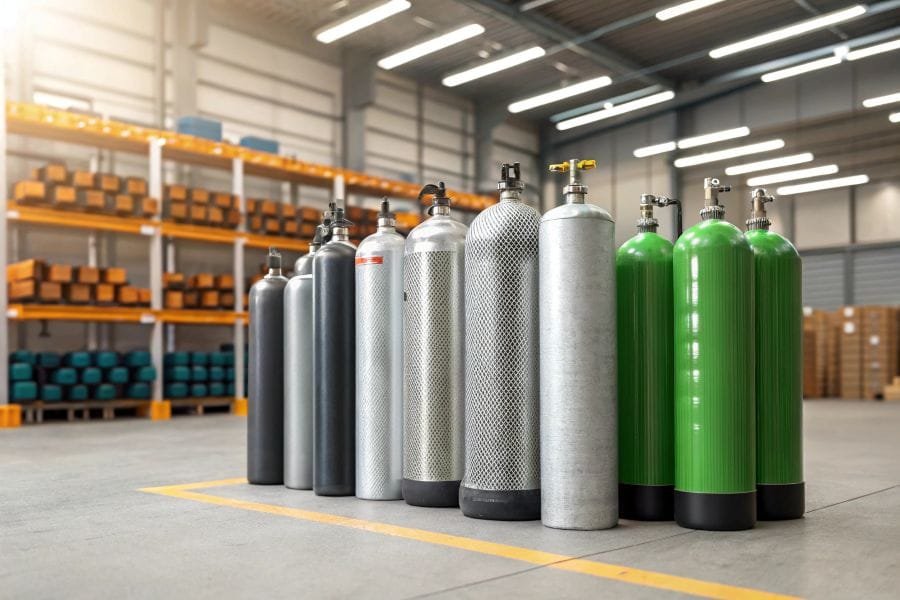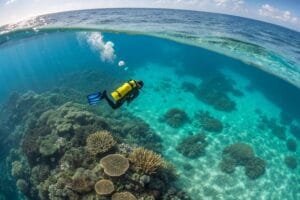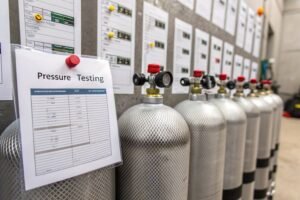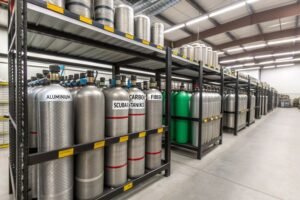Your inbox is overflowing. Your warehouse has mixed stock from three different suppliers. Juggling it all is a nightmare. What if you could simplify everything and grow your business faster?
Partnering with a single, versatile dive cylinder manufacturer is the most effective way to streamline your business. It reduces your administrative workload, lowers shipping costs, ensures consistent quality, and gives you a wider product range to offer your customers, directly boosting your profitability.
I talk to business owners like you every day. They are experts in their local markets, whether they run a chain of dive shops or a gas-filling station. But they often face the same frustrating challenges when it comes to sourcing equipment. They are stuck dealing with multiple suppliers, each with their own communication style, quality standards, and shipping schedules. It’s a huge drain on time and resources. The good news is that it doesn’t have to be this way. Switching to a single-source supplier is more than just a convenience; it's a powerful business strategy. Let's break down exactly how this approach can solve your biggest headaches and unlock new growth.
Are you losing time and money by managing too many cylinder suppliers?
You're trying to track orders from different factories. The quality from one shipment is great, but the next is disappointing. The costs are adding up, and you feel stuck.
Yes, you are almost certainly losing money. Managing multiple suppliers creates hidden costs in administrative hours, complex shipping, and inconsistent quality control, all of which eat directly into your profit margins.
The Hidden Costs of Juggling Suppliers
When you source from multiple factories, the price on the invoice is just the beginning of the story. I once worked with a client, let's call him Michael, who was buying aluminum tanks from one factory in Asia and some specialty tanks from another in Europe. He thought he was getting the best price from each. But he was spending hours every week just managing the two relationships. He had double the emails, double the paperwork, and double the number of people to chase for updates. This administrative overload is the first hidden cost.
The second, and more dangerous, cost is inconsistent quality. One factory might have excellent welding, while another has better paint finishing. When you sell these tanks under your brand, your customers don't know they came from different places. They only know that some products are better than others, which hurts your reputation. Finally, there's the shipping chaos. Coordinating two smaller shipments is often more expensive and complicated than one larger, consolidated shipment. You lose out on volume discounts for shipping and have to manage two sets of customs documents. These small costs add up to a significant financial drain over a year.
| Challenge | Impact of Multiple Suppliers | Benefit of a Single Supplier |
|---|---|---|
| Admin Time | Hours spent on separate communications, invoices, and follow-ups. | One point of contact, one set of paperwork. |
| Quality | Inconsistent product quality and standards across batches. | Consistent, reliable quality that protects your brand. |
| Shipping | Higher costs for multiple, smaller shipments; complex logistics. | Lower costs from consolidated shipping; simplified logistics. |
| Inventory | Difficult to manage and forecast stock from different sources. | Simplified inventory management and clearer forecasting. |
How can partnering with a single-source manufacturer streamline your procurement process?
Your procurement process feels chaotic and unpredictable. You're constantly chasing updates and putting out fires instead of focusing on growing your business. There must be a smoother way to operate.
A single-source partner gives you one dedicated contact, one predictable production schedule, and one consolidated shipment. This massive simplification saves time, reduces errors, and makes your entire inventory planning process more reliable.
The Power of a Single, Reliable Partner
Imagine this: instead of emailing three different sales reps, you have one person you can call. This person, your dedicated account manager, knows your business inside and out. They understand your market, your typical order size, and your quality expectations. You don't have to re-explain your needs every time you place an order. This is the first and most powerful benefit of streamlining your procurement. It builds a real partnership. At our company, we make sure every wholesale client has a dedicated contact who is responsible for their success.
This simplification extends to every part of the process. Your ordering process becomes easier, often with preferential terms or volume discounts that you couldn't get by splitting your orders. Your logistics become a breeze. We work with you to schedule one large, consolidated shipment. This not only saves you money on freight but also makes tracking and customs clearance significantly easier. You receive one invoice. You make one payment. The time saved on accounting and administration alone is a huge win. This newfound efficiency allows you to focus your energy where it matters most: serving your customers and growing your business.
What are the key differences between aluminum and carbon fiber dive tanks, and why should your supplier offer both?
You mostly sell standard aluminum tanks because they're reliable. But you see competitors attracting high-end customers with lightweight, modern tanks. Are you missing out on a key market segment?
Aluminum tanks are the durable, cost-effective choice for everyday diving. Carbon fiber tanks are the premium, lightweight option for traveling and technical divers. A supplier offering both allows you to capture the entire market.
Serving Every Diver, From Beginner to Pro
Not all divers are the same, so their equipment shouldn't be either. Your ability to cater to different needs is what will set you apart from the competition. This is why it’s so important to partner with a manufacturer that produces both aluminum and carbon fiber cylinders. Let's look at them side-by-side.
| Feature | Aluminum Dive Tanks | Carbon Fiber Dive Tanks |
|---|---|---|
| Material | Aluminum Alloy 6061 | Carbon Fiber Composite with Aluminum Liner |
| Weight | Heavier | Significantly Lighter (up to 50% less) |
| Buoyancy | More negatively buoyant | Closer to neutral buoyancy |
| Pressure | Typically 200 bar / 3000 psi | Can go up to 300 bar / 4500 psi |
| Cost | Lower, more affordable | Higher, premium price |
| Best For | Rental fleets, local diving, budget-conscious divers | Traveling divers, technical diving, divers wanting less weight |
Aluminum tanks are the undisputed workhorse of the diving world. They are tough, resistant to corrosion, and have a very long lifespan if cared for properly. They are perfect for rental programs and for divers who primarily dive locally.
Carbon fiber tanks are all about high performance. Their biggest advantage is their light weight. For a diver who travels frequently, shaving several kilograms off their gear is a massive benefit. They can also hold gas at higher pressures, meaning more air in a similar-sized tank. This is a huge plus for technical divers who need longer bottom times. By offering both, you become a full-service provider. You can equip the new diver getting certified and also sell a high-margin upgrade to the experienced pro.
How can you verify the quality and safety certifications of an overseas gas cylinder factory?
You’ve found a potential supplier overseas that looks promising. The prices are good, but you're worried. How do you trust the quality and safety of a product you can't see being made?
Ask for their core certifications immediately. For cylinders, this means ISO (e.g., ISO 7866), DOT (for the US market), or TPED/CE (for Europe). A reputable manufacturer will provide these documents without hesitation.
Your Checklist for Vetting Manufacturer Quality
Safety is non-negotiable with high-pressure gas cylinders. A failure can be catastrophic, and as a seller, the liability falls on you. Vetting an overseas manufacturer's quality is the most important step you will take. I've built my factory's reputation on transparency, so I'm happy to share the exact things you should demand.
First, ask for their international standard certifications. These are not optional.
- ISO: The International Organization for Standardization sets global standards. For aluminum cylinders, look for
ISO 7866. For carbon fiber composite cylinders, it'sISO 11119. - DOT (Department of Transportation): This is mandatory for any cylinders sold or used in the United States.
- TPED (Transportable Pressure Equipment Directive) / CE Mark: This is the equivalent for cylinders sold or used within the European Union.
Second, dig deeper than just the certificates. Ask about their quality control (QC) process. A great factory can describe their process in detail. For example, we perform a series of tests on every single batch, including hydrostatic testing (to check for leaks and structural integrity) and, periodically, burst testing to ensure they exceed safety margins. We can provide the test data for your specific order. Ask if the manufacturer can trace the raw materials for every cylinder back to the source billet. This "material traceability" is a hallmark of a high-quality operation. Any hesitation to provide this information is a major red flag.
What should you look for in a manufacturer to guarantee fast, reliable delivery for your wholesale orders?
Your current supplier is always late. These delays create a domino effect, leading to backorders, lost sales, and frustrated customers. You need a partner who respects your deadlines as much as you do.
Look for a factory with significant production capacity, like multiple production lines, and an experienced logistics team. Ask for their average lead times upfront and how they communicate production updates.
Building a Supply Chain You Can Count On
Fast and reliable delivery isn't about luck; it's about the manufacturer's operational capability. When you're vetting a new partner, you need to look "under the hood" at their factory setup. The first thing I always point out to potential clients is that we operate five separate production lines. This is a huge advantage. It means we have massive capacity to handle large wholesale orders. More importantly, it provides redundancy. If one line needs scheduled maintenance, the other four keep running. Your order doesn't get pushed back for weeks because of a minor issue.
Another key factor is their management of raw materials. A factory that has to order aluminum billets only after you place your order will always have longer lead times. Ask them if they keep a ready stock of raw materials. This practice alone can shave weeks off your delivery time.
Finally, a great manufacturing partner has an expert logistics team. They should be able to provide clear shipping quotes, handle all the export documentation, and work with reliable freight forwarders to get your products to your port smoothly. Consistent, transparent communication is the glue that holds this all together. You should get regular updates on where your order is in the production cycle without having to ask. This level of professionalism turns a simple supplier into a true, reliable partner.
Ready to simplify your supply chain? What are the essential questions to ask a potential one-stop cylinder manufacturer?
You're convinced that a single-source supplier is the way to go. You’re ready to start the conversation, but you want to make sure you cover all the bases and choose the right partner.
Go into the conversation with a clear checklist. Ask about their full product range, all relevant safety certifications for your market, their production capacity, and their communication process.
Your Vetting Checklist for a New Manufacturing Partner
Choosing a new manufacturing partner is a major business decision. Being prepared for that first conversation can make all the difference. Treat it like an interview. You are hiring them to be a critical part of your business. Based on my experience from both sides of the table, here are the essential questions you need to ask to find a reliable, high-quality, one-stop supplier.
- Product Range: What is your full range of dive cylinders? Do you offer both aluminum and carbon fiber? What sizes and pressure ratings are available?
- Certifications: Can you please provide copies of your ISO, DOT, and/or TPED/CE certifications? Are you certified for the specific models I want to order?
- Production & Lead Time: What is your Minimum Order Quantity (MOQ)? Based on that quantity, what is your typical production lead time? How many production lines do you operate?
- Quality Control: Can you describe your quality control process from raw material inspection to final hydrostatic testing? Can you provide QC reports for my specific production run?
- Communication & Support: Who will be my single point of contact at your company? How often can I expect updates during production?
- Logistics & Payment: Can you help arrange shipping to my port in [Your Country]? What are your standard payment terms for a new wholesale partner?
- References: Would you be willing to provide a reference from another buyer in my region?
A great partner will be able to answer these questions clearly and confidently. They will see it not as an interrogation, but as the start of a transparent and professional long-term relationship.
Conclusion
Switching to a single-source manufacturer simplifies logistics, guarantees quality, and expands your product line. This strategic move saves you time and money, positioning your business for serious growth.







